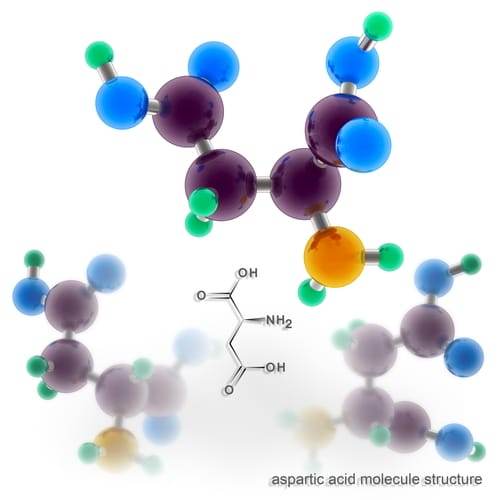D-aspartic acid, an amino acid with an acidic side chain, can be found as the foremost ingredient in the majority of bodybuilding supplements on the market.

However, not only is this amino acid meant for use only by consumers that are at least twenty-one years old, but its efficacy in human consumers is also called into question at times.
Regardless, any consumption of supplements that contain D-aspartic acid – which is usually listed as “D-AA” – must only be done under the educated oversight of a physician.
The Function of Aspartic Acid
Aspartic acid, in its generalized form, is produced internally by the body so long as the individual consumes food that contains essential amino acids.

While aspartic acid is an example of an amino acid that can serve the critical bodily function of synthesizing proteins, it is because the body can supply enough of it on its own if the person eats an adequate amount of foods rich in essential amino acids that aspartic acid is ruled as a “non-essential” amino acid.
Distinction Between Forms of Amino Acids
With the exception of glycine, all amino acids that are relevant to a body’s muscle-growing and protein-synthesizing procedures – including aspartic acid – come in two practically identical variations. Whether amino acid molecules are in their “D-forms” or “L-forms” dictate how certain parts of them react when exposed to light, and these variations have different applications.
Only L-form amino acids factor into the aforementioned procedures that foster muscular growth and protein synthesis, and L-aspartic acid in particular is involved with the process that forms the molecules partially responsible for DNA construction. D-form amino acids, meanwhile, factor into various processes elsewhere.
Aspartic Acid’s Proposed Relevance to Testosterone
Of aspartic acid’s two forms, D-AA has been proposed as the sole variation that has a role in testosterone production; this was proposed by a study carried out by the University of Naples, and a publication titled “Brain Research Reviews” formally agreed with it.
The study examined the effects that applying D-AA had on birds and found that the acid causes the consumer’s brain to generate Lutenizing Hormone, which proceeds to enter Leydig cells in the testicles and stimulate their testosterone-creating function.
Do Humans Benefit From D-AA?
What few attempts have been made to examine the effects of D-AA on humans have not been as conclusive as the studies that used animals as test subjects.

However, once said subjects ceased consumption for three days straight, they experienced a 10% decrease to their levels. Meanwhile, there have yet to be any studies that examine the effects of D-AA in the long term.
Most Appropriate Dosage Rate for D-AA
As was suggested by the study conducted by the University of Naples, if you plan to supplement yourself with D-AA, use roughly 3.12 grams on any given day. While this figure may or may not be listed on products that contain this acid, you must read and consider following whatever recommendation is printed on the product’s label by its manufacturer regardless.
